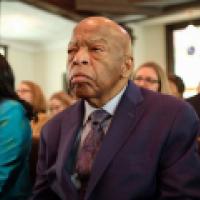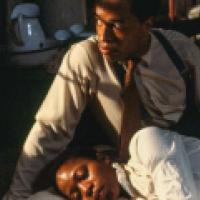Film series: Black Lives on Screen

image: John Lewis stands on Black Lives Matter Plaza, Washington, DC (photo Jonathan Capehart, Washington Post)
“While my time here has now come to an end, I want you to know that in the last days and hours of my life you inspired me. You filled me with hope about the next chapter of the great American story when you used your power to make a difference in our society. Millions of people motivated simply by human compassion laid down the burdens of division. Around the country and the world you set aside race, class, age, language and nationality to demand respect for human dignity.
“That is why I had to visit Black Lives Matter Plaza in Washington, though I was admitted to the hospital the following day. I just had to see and feel it for myself that, after many years of silent witness, the truth is still marching on.” – John Lewis
“We were born with instructions: to form a more perfect union.… John Lewis—the first of the Freedom Riders, head of the Student Nonviolent Coordinating Committee, youngest speaker at the March on Washington, leader of the march from Selma to Montgomery, Member of Congress representing the people of this state and this district for 33 years, mentor to young people, including me at the time, until his final day on this Earth—he not only embraced that responsibility, but he made it his life’s work.” – Barack Obama (eulogy for John Lewis)
John Lewis: Good Trouble (2020), recently released (a documentary in which John Lewis reflects on his decades of activism) joins three other urgent films in our Black Lives on Screen series.
People, protest and the police are not new to Portland. Arresting Power: Resisting Police Violence in Portland, Oregon (2015) looks back at 50 years of the history of conflict between the Portland police and community members. Rose Bond writes in her review for Afterimage:
“In rare confluences of timing and artfulness, documentary films, at their best, can fill a breach, sound a clarion call, and coalesce communities to action.… Bucking the current Portlandia image, the film builds a context for understanding systemic racism in Portland through the long lens of history. Oregon was the only free state to be admitted to the Union with racial exclusion laws built into its state constitution. The filmmakers broaden their scope and point to the early Texas militia as an origin for local police forces. Returning to Oregon, they draw the link between the political/business interests of the state’s early white majority and the persistent Ku Klux Klan activity that flourished throughout Oregon well into the mid-twentieth century.”
One of those filmmakers is Cornell alum Julie Perini ’00, who will join us, possibly joined by one or both of her co-directors/media activists, for a Q & A, on Wednesday, September 23 at 7:30pm, in a discussion that will include Sabrina Karim, an assistant professor of government at Cornell, who is an international expert on police reform.
Emmy Award-winning documentarian Horace B. Jenkins’ only feature narrative, Cane River (1982), was lost for 40 years (Jenkins died shortly after completing it.) Made with an entirely African American cast and crew, the film is a romance set against a troubled past in a Louisiana between the lighter-skinned descendants of the “free colored”—propertied, and some even owning slaves—and the darker-skinned descendants of those same slaves. A negative turned up in 2014 and IndieCollect worked to restore it. Reviewing the film in the New Yorker, Richard Brody writes:
“Jenkins (extending a cinematic tradition that enfolds such Hollywood films as Jacques Tourneur’s Stars in My Crown and Otto Preminger’s Hurry Sundown) depicts the inextricable bonds between racist oppression and the economic subjugation of black Americans—and, here, he does so without reference to white saviors or even sympathizers. The drama of Cane River is embodied in the concept of independence—here, specifically that of African-Americans, and of women—which is inseparable from a confrontation with, and an overcoming of, the burdens of personal and collective history.
“Cane River, for all its plain-spoken gracefulness, is a drama of the word made into image—of bodies and landscapes, houses and cities, rivers and roads given a new dimension of existence by way of active thought, spoken in intricately confrontational dialogue, written in a notebook, read from a scholarly tome, even slipped on a scrap of paper into a waiting hand. It’s filled with the constraining power of the past—of family tribulations, local traditions, exhausting memories of pain, and blindly borne and unexamined identities—and the frozen resignation and benumbed passivity that it instills like an inner permafrost. It’s a drama of remaking the present by reclaiming the past—not by bypassing or dismissing it but by revealing its silent presence and bringing it to the fore, as if with artistic X-rays, and by reimagining a personal past in the light of political and social history. In its modest, forthright warmth, Cane River is a work of visionary artistry and progressive imagination.”
Bill Duke’s (The Rage in Harlem, Deep Cover) The Killing Floor first feature premiered on PBS’ American Playhouse in 1984, and it returns in a new 4K restoration. Obie winner Leslie Lee’s screenplay follows the true story of the struggle to build an interracial labor union in the Chicago Stockyards. Management’s efforts to divide the workforce on racial lines contributed to the Chicago Race Riot of 1919. As Richard Brody writes in the New Yorker,
“a revelatory historical drama that offers a powerful template for social analysis in fiction.… The film follows Frank Custer (Damien Leake), a young black man who, in 1917, moves from his small hometown to Chicago. There, he finds work in a slaughterhouse, joins its union, and organizes other black workers. But, the following year, when the First World War ends and returning veterans reclaim their jobs, management undermines the integrated union by stoking dissension between black laborers and white ones; that conflict leads, in 1919, to race riots that leave the city’s black neighborhoods in ruins.”
In addition to Leake, the crackerjack cast includes Moses Gunn, Alfre Woodard, Mary Alice and Dennis Farina.
We also recommend checking out the short film T, screening as part of the Sundance Film Festival Short Film Tour 2020. In director Keisha Rae Witherspoon’s “tender, eye-opening documentary about Miami’s T Ball, people model T-shirts and elaborate costumes to honor people in their lives who have recently died. Witherspoon follows three participants of the ball, collecting heartbreaking stories and memories that make the people telling them smile.” (moviecricket.net)




